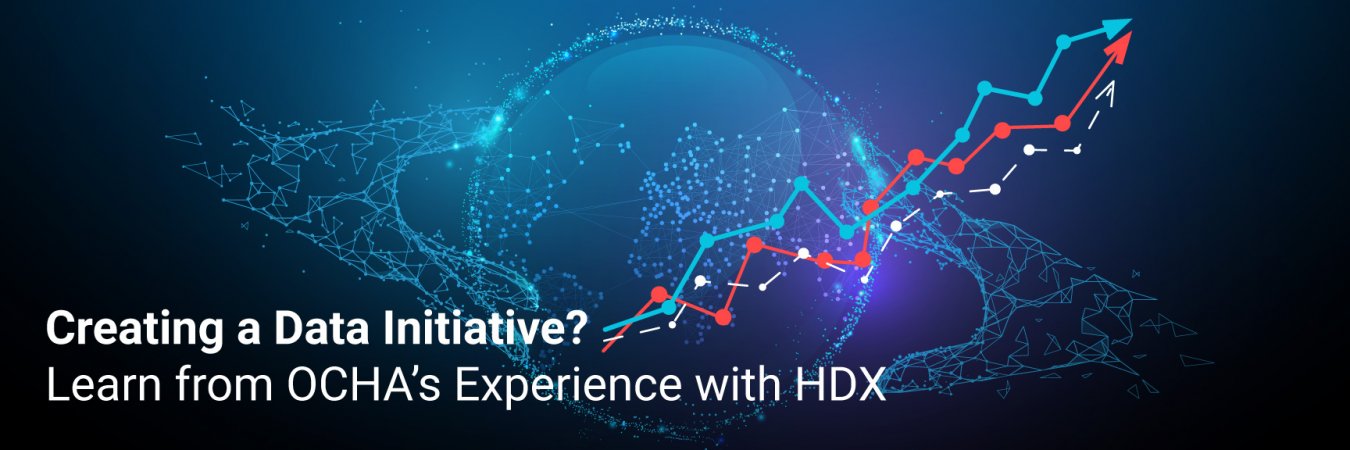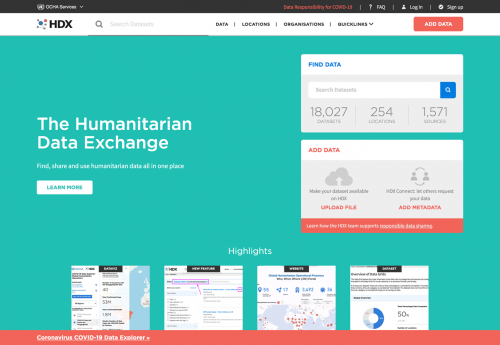- English
- Français
Creating a Data Initiative? Learn from OCHA’s Experience with HDX

 19 October 2021
19 October 2021
By Sarah Telford, Lead for the United Nations Office for the Coordination of Humanitarian Affairs Centre for Humanitarian Data
The Humanitarian Data Exchange (HDX) is an open platform for sharing data across crises and organizations. Launched by the United Nations Office for the Coordination of Humanitarian Affairs (OCHA) in July 2014, the goal of HDX is to make humanitarian data easy to find and use for analysis. Today, the 18,000 datasets on HDX cover every active humanitarian crisis, from Afghanistan to Yemen. In 2020, HDX was accessed by over 1.3 million people and from almost every country in the world.
To share lessons from creating and managing HDX, we developed a case study on critical decisions we have made along the way. There is little documentation on this type of work, and we hope that our case study might contribute to this literature so that we can understand the promise and potential pitfalls of introducing change into our work. Even as innovations like HDX become established services, they require continued investment to truly scale and deliver on long-term goals.
Key Learnings
In creating HDX, the main challenge we were trying to address was that humanitarian data was hard to find, and once found, it wasn’t clear if it could be trusted: Was it the latest version? Was there any metadata about the source and data collection methodology? Getting access to data, and answers to questions, depended to a large extent on personal connections. We began to research options and approaches for managing data and making it openly accessible.

The case study includes a list of 11 lessons. Following are five that may be particularly helpful for departments and organizations working within the United Nations on product innovation; although we understand they may not be transferable to all organizations and cultures, or to those working on non-technical innovations.
1. Be user-driven
Any technical tool is likely to cost millions of dollars to develop and maintain over its lifetime. Investing in user research upfront and continuing to solicit user feedback lowers the risk of failure and can save money. We partnered with design consultancy Frog Design Inc. to conduct extensive user research in early 2014 and re-engaged them and other firms as we considered major feature improvements.
2. A network or distributed model allows for scale
‘But does it scale?’ is a good question to keep asking yourself as you establish processes and systems for a tool or platform. HDX was designed to allow approved organizations to share data from anywhere in the world, simultaneously making it accessible to everyone in the world.
3. Put trust front and center with any work on data
Trust powers the data economy in the humanitarian sector. Without it, data is not shared. Build and maintain trust between organizations by ensuring, to the extent possible, that data is used for the purpose that was originally intended and that data does not end up in the wrong hands. We took time to develop the HDX Terms of Service and a quality assurance process for data shared on HDX.
4. Have a geographically distributed team
Obviously, diversity in skills and culture is good for creativity and problem solving within a team. Having personnel in field locations also helps to build local relationships around data sharing. HDX established its first field team in the OCHA office in Nairobi in 2014 and subsequently established teams in the OCHA office in Dakar in 2016 and in Jakarta in 2018 in partnership with UN Global Pulse.
5. Measure things that matter
Consider what success looks like and figure out a way to measure it. Be transparent about your goals by sharing your results framework publicly. Signal your ambition and ask for help in getting there. We established an objectives and key results framework in 2015, and review our results quarterly.
Conclusion
As HDX continues to scale and mature, its development will be guided by user feedback and our community of data contributors. While most of our time is now spent on maintenance — making sure things are working as they should be — we also want to optimize the experience in several ways, from quicker search results to streamlined quality assurance processes and improved data ‘freshness’.
OCHA established the Centre for Humanitarian Data in The Hague in 2017 to build on the success of HDX and take on a wider set of issues, including data responsibility, data literacy and predictive analytics. We look forward to working with other parts of the UN system and local and international organizations worldwide to increase the use and impact of data in our work.
Contact us at centrehumdata@un.org if you are interested in collaborating or if we can help in any way.
Note: The views expressed herein are those of the author and do not necessarily reflect the views of the United Nations.

